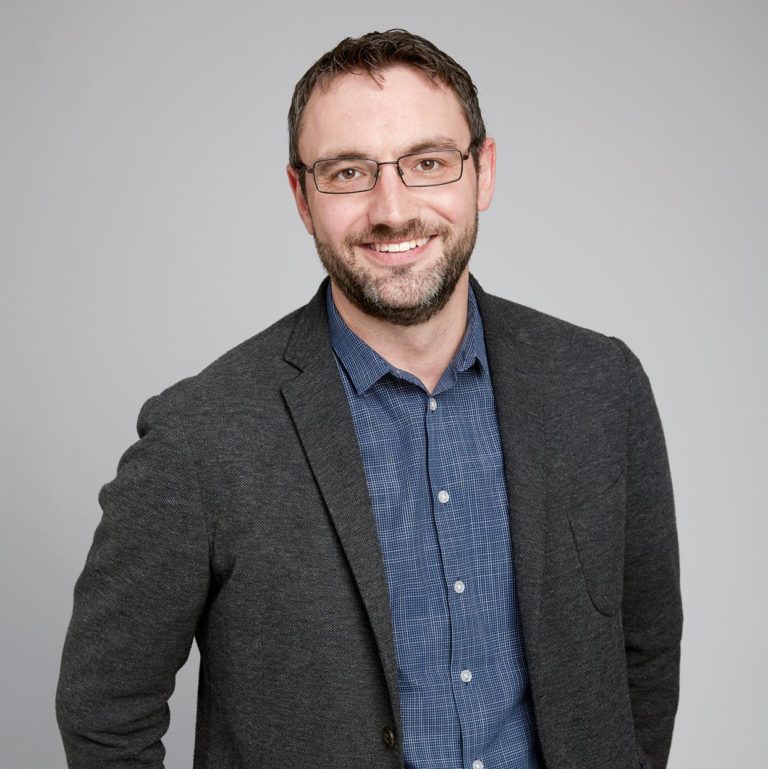Jordan Heath-Rawlings

Jordan Heath-Rawlings, School of Journalism ’05, is Director, Digital Radio and Podcasts at Rogers Media and Host of The Big Story (external link) and The Gravy Train (external link) .
What did you originally see yourself doing when you first enrolled in journalism school?
Honestly? Being a superstar crackerjack news reporter that uncovers corruption, helps the wrongly convicted and, you know, saves the world in a newspapery way.
How did that vision change as the years went by?
Ummm….massively? The realities of the industry hit everyone—and I don’t mean in a bad way. Once I began learning more about the actual production of news, the art of writing to deadline and the entire infrastructure that goes into making a paper, website, broadcast or whatever function on a daily basis, immersing myself in the big picture of how it all works became more important to me than being the Big Superstar Reporter. Also, Big Reporters work 80+ hour weeks. And that’s not an exaggeration, and after a few years chasing that, I was ready for a more sane job.
Thinking back to your first year self, how do you think they would react to where you are now?
They would ask me what the hell a podcast is.
What do you think the School of Journalism experience offers that you can’t get anywhere else?
I benefited greatly during my time at [the university] from a staff that cared about getting me actual experience—whether that was one professor making sure we all saw the summer internship postings and that the people hiring for those saw our applications, or even simply understanding that if I wasn’t necessarily in class every single time, because I was closing an issue of The Eyeopener, that wasn’t the worst thing in the world. The saying is supposed to be ‘Those who can’t do, teach.’ But my impression during my time at [the university] was that all my professors could do and had done, and were now doing this.
What have you done since graduating/how did you arrive at your current position?
Oh, you know, the typical trying-to-stay-employed/endless-adventure career we all hope for. I was a reporting intern, then a contract reporter, then an entry-level editor at a commuter paper, then a section editor at a commuter paper, then a senior editor at a newly founded sports magazine, then deputy editor, then coordinating special projects for a group of magazines and then a podcast host/running a podcast network. Honestly, I’ve been extremely lucky. I know people way more talented than me who lost their jobs along the way. I guess the only explanation I have as to how I’m still employed and happy is that I’ve always been willing to try something new and I’ve had amazing bosses who have let me try to stretch my skills in one area into a new one. And in this industry, that’s extremely important.
How has your journalism degree and what you learned in school prepared you for your current career?
By teaching me how to ask questions and listen for the answers. It is that simple. That’s been a huge part of every gig I’ve ever had. It also taught me to SPELL NAMES RIGHT OR DIE.
Can you talk about one of the biggest accomplishments you've made?
Launching the Big Story podcast at a time when Canada had no daily news podcasts, and watching some o the country’s biggest media companies follow our lead has been a career highlight. It also has allowed me to get back to interviewing every day, which I love.
Can you talk about one of the biggest challenges you've faced as a journalist?
It’s tough to work at a place with almost not a ton of resources, and I’ve worked at a couple of them. I think every journalist can relate to the feeling of knowing there’s so many more stories to tell if only you had the time and space and people to tell them. I’m not ragging on any employers either—that’s a reality of the industry. And it’s frustrating.
What's one of your favourite memories from j-school?
Strangely enough, it was getting BEAT on a story by the competing student paper. We missed it, they got it, and the competitive juices started flowing and I learned never to take a story or source for granted. Also, it’s a memory I’ll always have with those particular people, many of whom I’m still in touch with today.
Any memorable School of Journalism professors during your time at the university?
Don Gibb! Always Don Gibb. Because he made you stop talking and thinking about being a reporter and just go and do it already. (And the spelling names thing.)
What advice would you give to current journalism students?
Go do the work. Go to class and take notes and ask questions, sure, but go find a place—at [the university] or in your neighbourhood—where people are trying to tell stories and go help them do it. I don’t mean go take an unpaid internship from a big company who just wants cheap help. I mean, go find folks who are struggling to get their stories told and tell them.
Grads at Work is an occasional series of profiles of alums. If you know of a notable grad you’d like to see featured, send us an email at office.journalism@torontomu.ca.